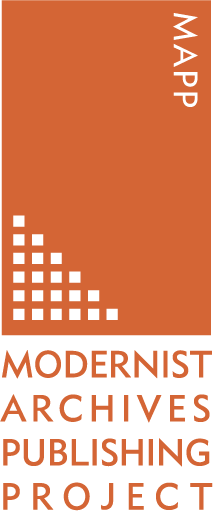The question of interfaces can be a vexed one for digital projects. Research-based projects are often discouraged from focusing too much on interface design, especially because digitization, robust metadata schema and creation, and careful archival description tend to be investments that can last for decades, whereas interfaces change with rapidly shifting tastes, softwares, and design trends. Data is usually exportable and transferable to a variety of formats, whereas the way a site looks is often locked into its particular instance of a content management system. Custom design can be very expensive, and it’s difficult to justify a high cost for a component of the project that may not last long. However, as Mitchell Whitelaw writes in DHQ, “interface plays an inescapable role in mediating digital heritage.” More and more cultural institutions are playing around with radical interfaces that present visitors with beautiful and inviting websites through which to access cultural materials. Whitelaw calls for a move away from an over-reliance on “search” and towards what he calls “generous interfaces” that innovatively invite exploration, honour the materials, and give web visitors something of a cultural experience akin to walking into the lobby of the Met or the atrium of the British Museum.
We’ve tried up to this point to strike a balance with MAPP: we’ve done the best we can to create a functional interface for free by acting as DIY designers with the Views offered in Drupal 7. We’ve integrated some elements of the interface that are important to us, such as the random gallery views of our different types of content, which captures some of the serendipity of opening an archival box without knowing what you’ll find. These are gestures of the kind Whitelaw encourages when he writes about “generosity” in interface design: they offer the reader a glimpse of materials they might not ask about and might not stumble upon otherwise. We also still love our book-shaped logo and our colour scheme, created by our former RA from the University of Reading, Matthew Standage.
But now, it’s time for a change and an update. We’re at a turning point here at MAPP, interface-wise. Drupal 7 is about to stop being supported and maintained, and we’re in the process of migrating to a new CMS called Backdrop (more on that in a later post!). This migration seemed to us the perfect time to re-think the aesthetic and functionality of our interface and to improve upon some of the clunky features of the out-of-the-box Views we’ve been relying on until now. We have also reached a point now in the project at which we have a ton of material that feels a little “buried” within the site: truly accessible only if you know it’s there. We’d like something better. We also want to honour the roots of MAPP in the design-focused and aesthetically beautiful books we digitize by creating a new interface that calls the combination of beauty and function found in the work of designers like McKnight Kauffer, Vanessa Bell, and Enid Marx to mind.
This summer, our wonderful Stanford RAs, Lily Nilipour and Khuyen Le, supervised by Alice and supported by CESTA, have been working hard on synthesizing all of our wishes and hopes for our new interface. They conducted interviews with each of our core team members and came up with this incredible Look Book to sketch out our ideas for the site. Over the next few months, we plan to use this document as a starting point for implementing a beautiful, shiny, new MAPP.
This is where you, our faithful readers, come in. If there’s a feature you would like to see on a newly-designed MAPP site, what would it be? What bothers you about our current site? What can’t you find that you’re looking for? Please do let us know! We want this site to serve you, and we want to know how our new interface can help you with the teaching or research or browsing you do on the site. We'd be delighted if you could fill in this Google Form with your feedback by October 1st, 2020. We will do our best to integrate and respond to all recommendations!



